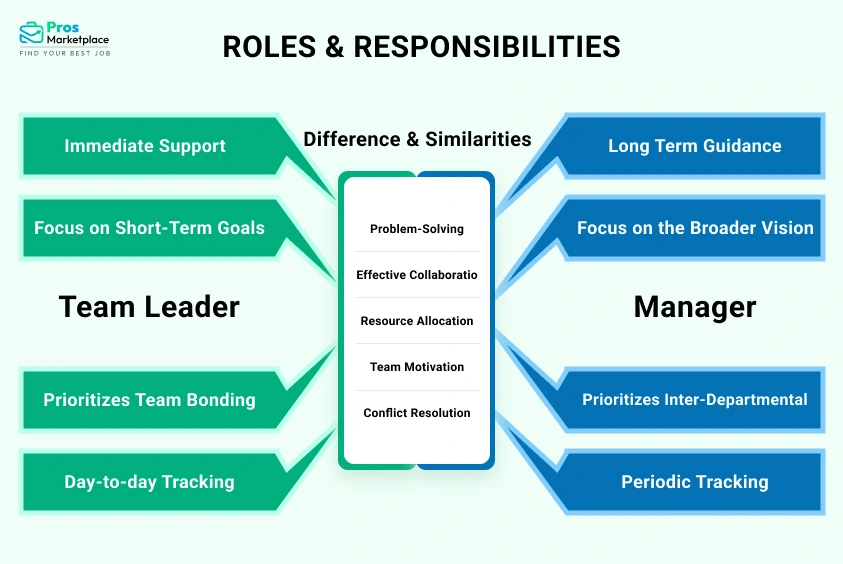As we are living in a modern corporate world, there are a lot of career fields and a whole other lot of team hierarchies. But, one thing that remains the same in almost all corporate offices and careers is the position of team lead and manager. The system is clear to nearly everyone working in corporate, but a particular factor creates confusion. What is the requirement of a team lead if there’s already a manager and vice versa? In this discussion of team lead vs manager, we’ll clarify their roles.
After all, managers receive higher compensation only because they overlook the entire team, and team leads are given the title because they do the same thing. Right?
While the superficial interpretation might be correct, there are a few complex details that are being missed here. In this blog, we’ll understand those details and figure out the difference between a team lead and a manager. Let’s dive deep:

The Leadership Dynamic: Team Lead Vs Manager
Having a basic idea of what the terms, ‘manager’ and ‘team lead’ mean will help you understand the rest of their roles and responsibilities and key differences that we will cover later in this blog.
A team lead is responsible for team collaboration and provides solutions in case the manager is not available immediately. Team leads also serve as a point of contact between managers and the entire team. Think of them like a football captain who manages your daily activities, guiding you every step of the way.
Managers, on the other hand, can be described as coaches. They focus on long-term strategies rather than handling day-to-day team hustle. They also serve as the main point of contact between the management and the team, thereby providing the team with a long-term vision.
Roles and Responsibilities: The Difference Between Lead and Manager
When we talk about z, their main responsibility is ensuring team collaboration while creating a road map for achieving short-term goals. You’ll also find them juggling relationship dynamics between team members. For instance, if a colleague is having trouble collaborating with other team members, it is the team lead who comes in first before the HR or the managers get involved. So, it’s safe to say that team leads are the informal authority.
Whereas, managers operate at a broader level taking care of long-term visions and goals. They do not get involved in the minute details but focus on the big picture. They also build interdepartmental relationships to improve organizational functioning. Moreover, important matters like budget allocation and resource requirements are also decided by managers. For instance, if the team is facing an extra workload and there is an urgent need to hire new personnel, managers are the ones who take the initiative to inform the HR department.
The Dual Roles of Team Lead and Managers
Managers serve as change-makers within the organization. They are the ones who introduce innovation while maintaining a balance between the company’s vision and mission. Be it market-level shifts or technological upgrades, managers are the ones who keep a bird’s eye view on any major shifts happening in the industry to keep the company at pace with its competitors. They then prepare the roadmap for the team to reach the desired outcome.
Team leads, on the other hand, are often seen as ‘strategy champions’ within their team. This is because they make sure to understand the long-term goals set by managers and collaborate with the team in its implementation. They also serve as a direct line of support, helping team members navigate new technological systems or processes. Moreover, in case of low employee morale, they provide one-to-one guidance to help the team navigate organizational shifts.
For instance, suppose a new software has been introduced, the manager’s task is to provide the introductory session. The team lead, on the other hand, will offer day-to-day support in case of any technical glitches or lack of understanding. Moreover, in case of any updates, the team lead here is responsible for guiding the team through it, whereas the manager will only take overall team feedback to understand the progress.
Need or Want? Nature of Team Lead and Managers
The dual positions of team manager and team lead are found in almost every corporate workplace. Be it IT, business consultancy, or any other organization, this duo is found almost everywhere. But do we need both of them? Or is it just a matter of want rather than need?
When it comes to larger organizations, the number of tasks to be completed in a short duration is huge. Be it rapid technological changes, resource addition, daily and weekly targets, or even yearly goals, you name the task and it has to be completed as early as possible. This can put an extra burden on a single position, whether it is of a team lead or a manager. Hence, it is recommended to have a separation of roles and responsibilities as discussed above to have work clarity and seamless execution of tasks
Small or medium-sized organizations, on the other hand, can take a look at their work requirements and the number of changes being introduced to the team every quarter. If there’s a startup culture within the organization, you might be having frequent changes in work culture, technological upgrades, resource additions, or changes. This will then call for a division of responsibilities. But, if you have an organization that is more traditionally rooted, the need for a separate team lead and manager becomes negligible.
Is a Team Lead Better Than a Manager or Vice Versa?
Conclusively if we think about the relationship between a team lead and a manager which is completely correlated and they seem to have the same roles and responsibilities i.e. a functional difference between a team lead and manager. On one hand, where managers keep a bird’s eye view of organization-wide shifts, team leads tend to focus more on departmental activities. Moreover, managers oversee innovation while team leads focus on its implementation. It is also important to note that the necessity of these dual positions depends on the nature and workload of the organization. So, whether or not you’ll need to hire both or just one of them, will depend on how your company goes about its day-to-day business. But the question, “Is a team lead better than a manager or vice versa” cannot arise because the importance of two roles depends on the work type and organizational needs.







